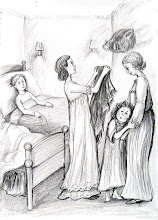Koutsantoni, Katerina. "To Forget One's Own Sharp Absurd Little Personality...& Practice Anonymity." Virginia Woolf's Common Reader. Surrey: Ashgate Publishing Limited, 2009. 101-122. Print.
Within Katerina Koutsantoni’s article, “To Forget One’s Own Sharp Absurd Little Personality…& Practice Anonymity,” she discusses Virginia Woolf’s writing as a whole. Koutsantoni specifically focuses on Woolf’s writing technique in being “impersonal” and being filled with anonymity due to the fact that Woolf did not want to bear a “close relation to the concept of society.” The point of view within the article continually states Woolf’s practice in impersonality in order to stray from the “mutual dependence” between identity and authority (101). Koutsantoni shows the reader how many major writers of Woolf’s period either did not understand this writing technique, or they disagreed with it. However, the point of view is in favor of Woolf’s technique due to the fact that the technique of impersonality strays away from bias, for the writer allows him or herself to be an entity rather than a certain person, or gender.
This particular article would be able to help in answering the given research question. Though it does not discuss the character of Lily Briscoe, it does discuss Virginia Woolf’s writing style. By understanding Woolf’s techniques, which consist of a narrator remaining anonymous, this adds to a reader’s understanding of the narration style within To the Lighthouse. Koutsantoni states within her article that the “transcendence and overcoming of personal experience, and thus anonymity and impersonality, became the precondition for the creation of art” for Woolf (121). This source is able to contribute, though not an abundance of information, enough information that shed’s light onto the narration and creative process that Woolf experienced. By reading this source, it can contribute an understanding of what Woolf tries to accomplish in her narration, and how she attempts to remain unbiased towards her characters. By allowing herself the freedom to keep her own personal voice out of the narration, Woolf is able to experiment with a voice that, in turn, allows her to show different biases in an impersonal, more logical way.
Friday, December 11, 2009
Subscribe to:
Post Comments (Atom)



No comments:
Post a Comment